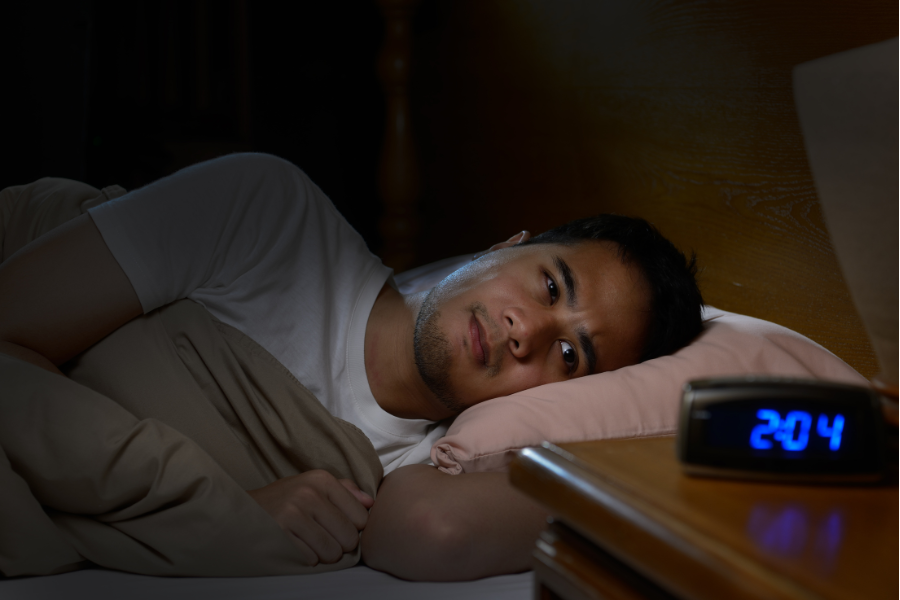It’s 4 am.
You’re nestled under your covers where you’ve been snoozing soundly for the past 4 hours — but suddenly, for reasons you can’t explain, you’re awake. Very awake. It’s too early to get up; if you do, your “daytime productivity” will almost certainly run out by lunchtime.
And yet … there you are, lying in the dark, with your eyes wide open. How can you coax your body (and mind) back into sleepy time? Here are a few tips on what to do (and what not to do).
#1: Try relaxation techniques
The first strategy you should try is to stay in bed first, try to relax, and see if you can fall asleep again. Relaxation techniques to try include:
- Deep breathing: Activates the parasympathetic nervous system (PNS), which is involved in relaxation and sleep. One deep breathing technique you could try is the 4-7-8 method: inhale through the nose for 4 seconds, hold your breath for 7 seconds, then exhale through the mouth for 8 seconds.
- Meditation: Encourages slower breathing and activates the PNS. Research shows meditation improves the quality and efficiency of sleep and how quickly you fall (back) asleep. A beginner-friendly way to practice meditation is progressive muscle relaxation — tense, then relax each muscle group, starting with your toes and ending with your head.
#2: Go to a different room
If you’re not, well, relaxed and drifting off after 20 minutes or so, don’t force sleep.
Continuing to remain in bed could create a sort of “sleep pressure”, where you grow (increasingly) frustrated about your inability to fall back asleep. This could then elevate your heart rate, production of stress hormones, and stress, which are all bad news for sleep.
So, get out of bed. Try relocating to another room that might help calm your mind. Ideally, this room has a couch to lie down and rest.
#3: Write down your worries
In a different room, but your mind is still running at a million miles an hour?
Find a pen and some paper, and commit your worries (e.g., your ridiculously long to-do list) to paper. This takes the commotion out of your head and clears your mind. Make sure you do this with dimmed lights and the “traditional” way — with actual pen and paper instead of digital pens and smart devices.
Why? This ties into the next point.
#4: Avoid blue light exposure
Any LED spectrum light source (yes, that includes your phone, so no scrolling of social media!) may further suppress melatonin levels. For the uninitiated, your body secretes melatonin in a 24-hour circadian rhythm, with the highest secretion during the night to promote sleep and minimal amounts during the day.
Still can’t sleep after writing down your worries?
A screenless activity option is reading a physical book, but grab the most boring one you can find because you don’t want to read anything too stimulating when trying to fall asleep.
#5: Stop checking the time
Watching the minutes pass — and determining how much time you have left to sleep (“Omg, I only have 2 more hours before I need to get up!”) — only ramps up your stress, making returning to sleep more difficult.
So, if you’ve got a clock on your night table? Consider turning it around or even removing it from your room.
Try to find out why you’re waking up in the first place
If you’re consistently waking up in the middle of the night, thinking about why it happens in the first place and addressing it could stop this nasty insomnia cycle. For example:
- Going to the bathroom: Frequent nighttime bathroom trips could disrupt your sleep. A few adjustments you could consider making include cutting back on fluids at night, especially alcohol and caffeine, reducing salt intake, maintaining a healthy weight, and pelvic floor therapy.
- Too much light in your bedroom: As mentioned earlier, light exposure suppresses your body’s production of the “sleepy hormone”, melatonin. Consider investing in blackout curtains if your blinds or curtains do not block outside light sufficiently.
- Noisy neighborhood: Woken up by the honking of cars? A budget-friendly way of “soundproofing” your bedroom is to play your own background noise, such as soothing nature sounds or music to mask the exterior noise.





























































Join in on the Conversation
Your email address will not be published. Once your comment is approved, it will be published.